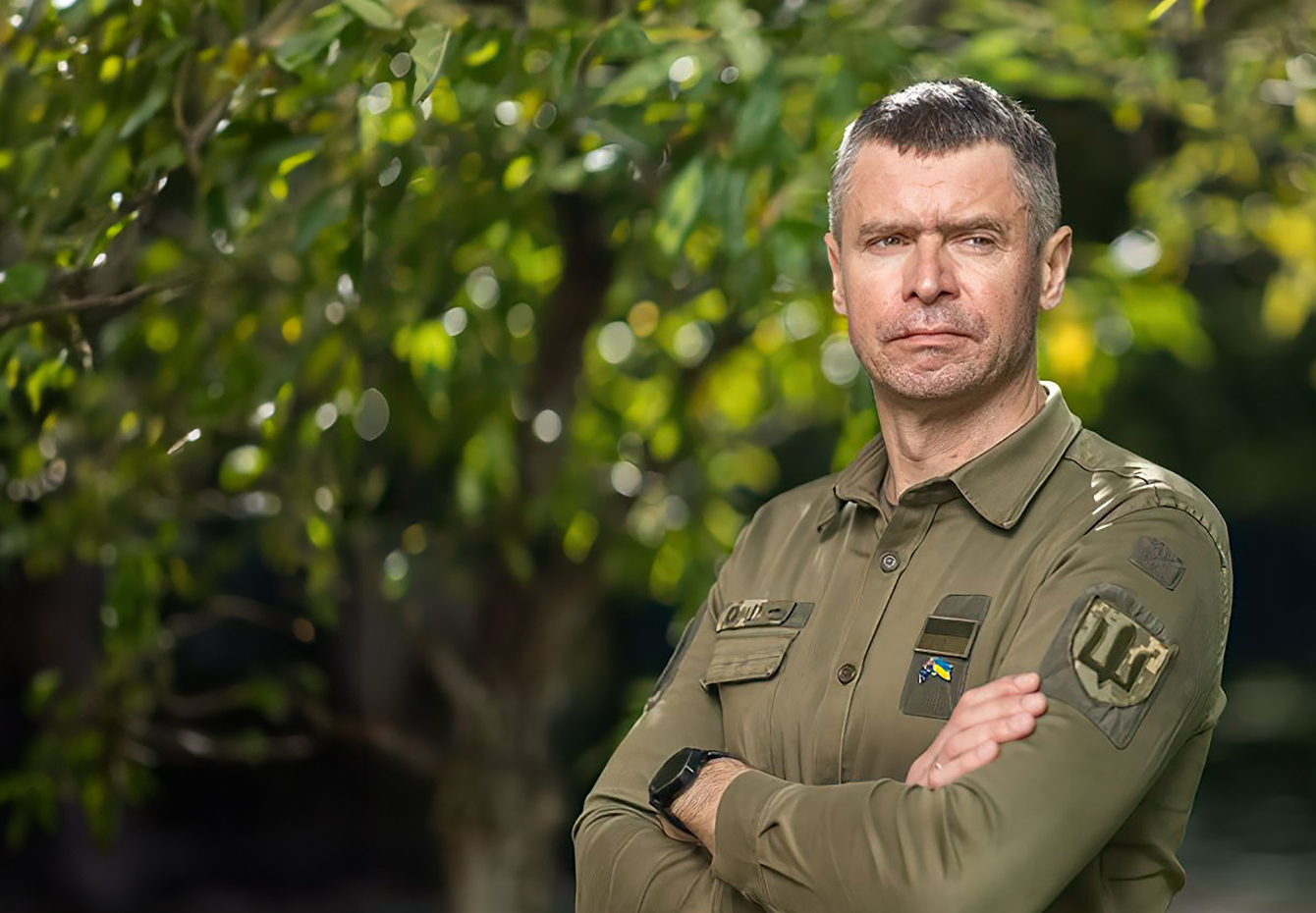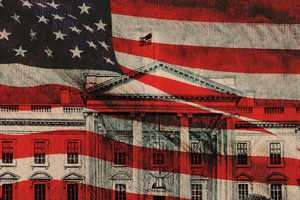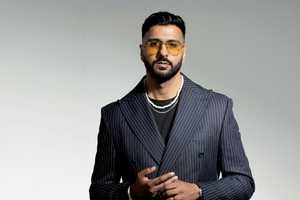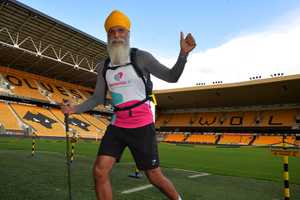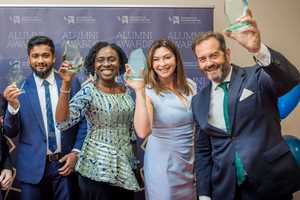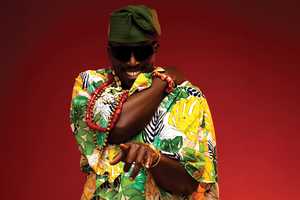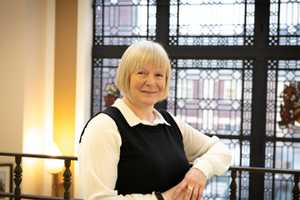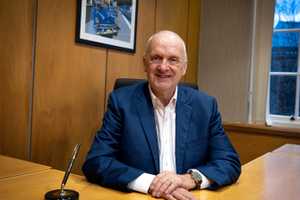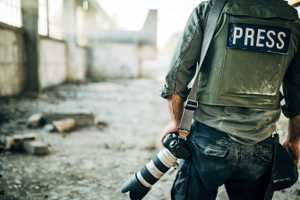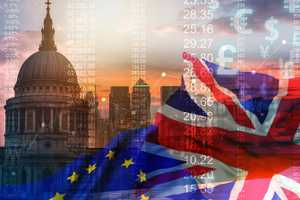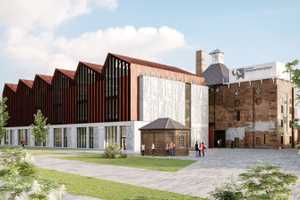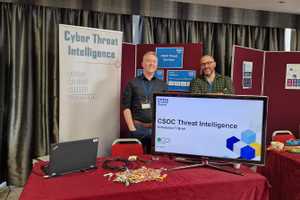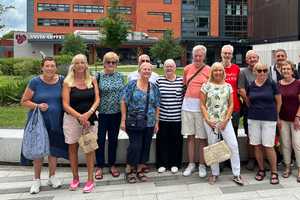Sitting in Costa on campus in Wolverhampton, with a steaming coffee on the table and the hum of noise from students and staff in the background, it can be hard to believe that some of our graduates are currently living in a war zone.
And yet, that’s been the cruel reality for millions of men, women and children on European soil 1,500 miles away in Ukraine. Among them are Yuriy Sak, advisor to the Minister of Strategic Industries of Ukraine, and University of Wolverhampton alumnus.
When Yuriy became a student in Ukraine, little did he anticipate how apt his Master’s thesis on peacekeeping operations and collective security would become later in his life. A Chevening scholarship brought him to the University of Oxford to study public international law.
Enjoying life in the UK, he applied to continue his studies further – leading him to Wolverhampton to study his PhD on the similarly appropriate topic of the human rights of internally displaced peoples. During his PhD he also taught at the law school on his specialism of international law.
“The University is such an exceptionally multicultural melting pot. During my studies there were people from Poland, Spain, Uzbekistan – Scotland, Ireland, Wales – from Pakistan, India, China. I just have memories of this feeling of always being supported.”
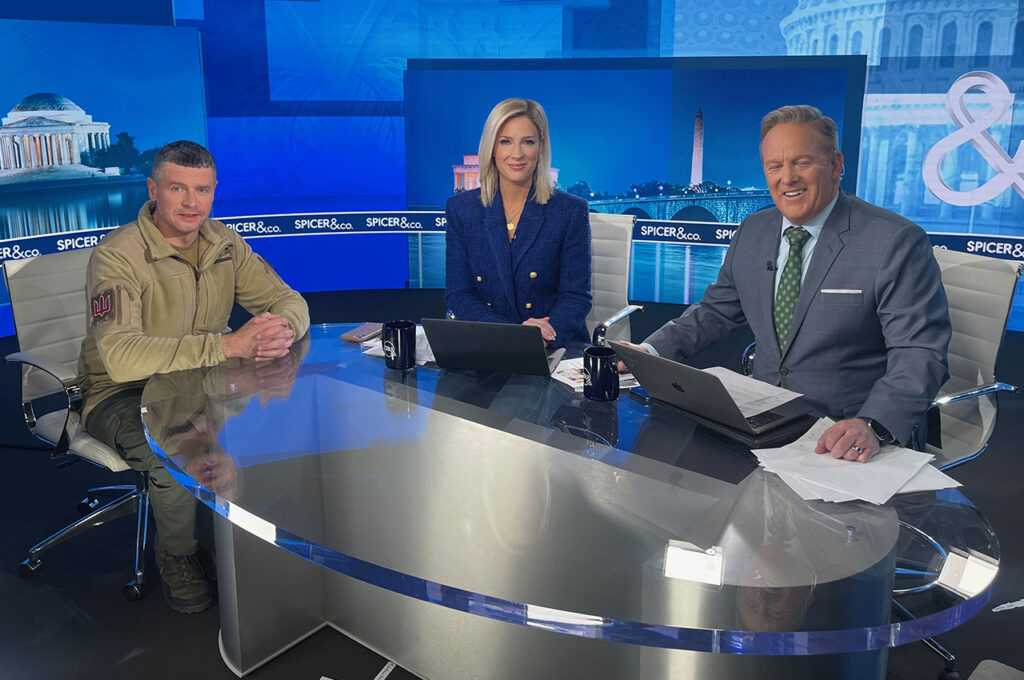
After leaving Wolverhampton, Yuriy pursued his acting ambitions, completing a four-year course at drama school, and then combining screen and theatrical work with applying his PR and crisis management knowledge working for a business consultancy, CFC Big Ideas. Having a family meant financial pressures necessarily leant towards more consulting work and less acting.
When Russia annexed Crimea, Yuriy and his colleagues noticed that Ukraine’s voice was missing from Western media. Together with others fluent in English, they set up the Ukraine Crisis Media Centre to be a platform for representatives from Ukrainian government to transmit their message to the world. “Our job was to fight the information war Russia was spending billions of dollars on."
For Yuriy, as for most of his countrymen, life changed unimaginably on 24 February 2022, when Russian forces entered Ukraine and began President Vladimir Putin’s “special military operation”. Having been working as a consultant and director of special projects at CFC Big Ideas, Yuriy describes sheltering from bombings in basements, whilst realising something must be done: but what?
“The war comes February 24th, 2022. We all wake up: the sound from the missiles over our heads. After three days of the initial shock and trying to make sure that our families are safe, at least in the basement where we live for the first days, my friends and partners at CFC got in touch with our friend Oleksii Reznikov [Minister of Defence of Ukraine until September 2023].
“Our job was to fight the information war Russia was spending billions of dollars on."
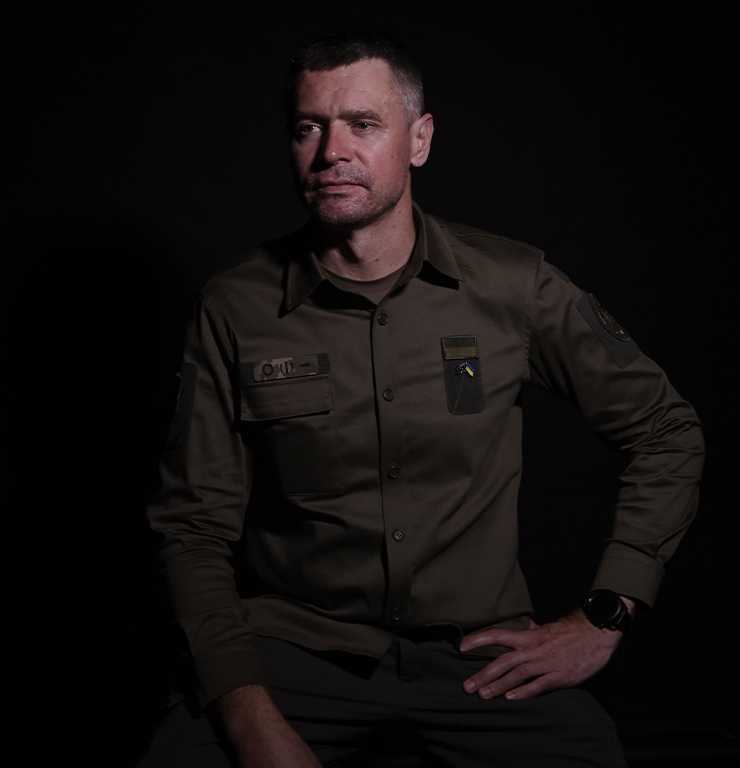
“We said: ‘Listen, we understand that Ukraine, as a country will need international support. You know that we have experience in communicating with Western media, decision makers, and think tank experts. We are happy to volunteer our time, expertise and resources to help our country.’ About half an hour later he appointed me his advisor and that’s how we all started. We assembled a team of about 20 people, got the keys to the Ministry of Defence Twitter account and that was that.”
Yuriy’s appointment demonstrates the swift pace of action required. This war is being fought as much online as it is on the battlefield. He has spent the last few years countering lies and information that can spread so rapidly in today’s world, particularly through social media, whilst also trying to harness the technology’s far reach to galvanise vital support.
“An internationally recognised success story is our information war against Russia: for a year and a half our team were producing content that was really changing, not just perception, it was making sure that Ukraine gets the weapons we’re asking for and the funds that we vitally need.
“On one of our social media accounts, we took it from almost zero to 2,000,000 active daily users [by September 2023], comprising all major international journalists: we’ve had articles about our team written by Financial Times, Bloomberg, Reuters, United.
“We did a lot of advocacy campaigns together with our partners and friends. At every stage of this war, we as a country, face problems acquiring certain types of weapons. We had to show the West that we can actually win this war, defend ourselves, and not collapse in three days as was predicted. No-one wanted a repeat of Afghanistan. Initially, even the Americans were not willing to give us simple things like stingers or handheld weapons, but little by little, thanks to a huge number of people - our expert community, civil society, politicians members of the parliament - we started to gain more support.
“I was given almost 1:1 responsibility for talking to foreign media. On Sundays I’d give over 10 interviews a day, in different time zones. I’d start early in the morning. As the globe turns and people wake up in one country and fall asleep in others, I would continuously be speaking with media, doing live interviews, comments, making sure that journalists got information that they’re seeking. I think in a year-and-a-half I must have given over 1,300 interviews!
“I have a contact at the BBC who told me recently that whenever they need to know what’s happening in Ukraine they say to press the ‘Yuriy Sak button’, so I must be doing something right!
“We have to show our allies that we can continue to stand. The UK was spectacular. Boris Johnson was probably the first international leader who came to Kiev. He walked in the central streets of Kiev with Zelensky, under air raid sirens, unafraid.
“We will never forget because this was super emotional. When you’re in Kiev and you think that the world is coming to an end, and you see Boris Johnson just show up with his messy hair and walk around. You think to yourself: ‘Hey, we’re not alone in this. With friends like this, we can continue to fight.’
“I’m not surprised by how we are supported by British people, because I felt it first-hand during my studies, long before the rest of Ukrainians had an opportunity to do that.”
Although Yuriy’s work continues to take him around the world – he was in Tokyo when we spoke – his heart is always in Ukraine. Like countless others he’s had to suffer being separated from his loved ones. He may have a job to do, and a war to win, but it comes at huge personal cost, and his emotion is clear:
“I try not to think about, how ****** up my life is. Because the moment I start thinking about it, I lose it. I haven’t seen my children in six months. They live abroad because of security reasons – I was able to take them out of the country.
“The number of important things – the kind of things that we remember when we are old – that I’ve already missed and are gone forever. I will never have a chance to relive them. I didn’t get to see my daughter’s first ballet performance. Or my son tells me it’s ‘Dad’s Day’ at school and all the dads come in and play football. I don’t know what to tell him.”
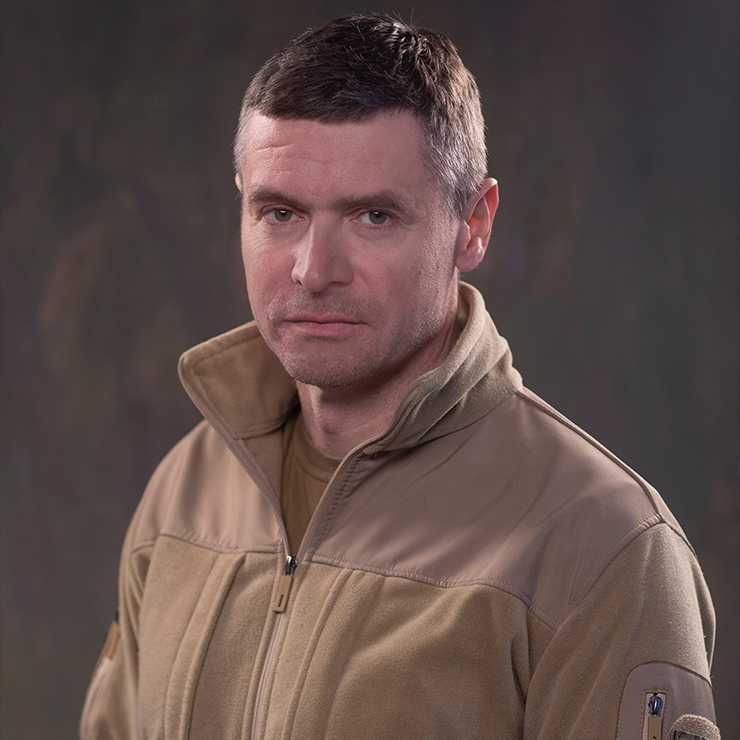
The impact and pain of being separated from his family comes across clearly when speaking to Yuriy. He speaks of “the devastating feeling of emptiness”. And, although he’s grateful he can speak to his son every day thanks to the technology that we have in this era, he also acknowledges that the mental scars on Ukrainian people are getting deeper the longer the war continues.
He explains that in many ways, life for those still living in Ukraine, particularly Kiev, can seem normal on the surface, with people going to shops or cafes. But then the air-raid sirens sound and everything changes: “People rush to bomb shelters, children are taken from their classrooms to shelters. You try to sleep at night, at 4am the air is silent until everyone gets the all-clear.
“We all talked about the ‘new normal’ when COVID happened: the masks, the gloves, the hand sanitizers. Now in a strange, weird, and really mentally unhealthy way in Ukraine we are living a new normal. It will take very long time for the country to recover psychologically. Even if we win the war tomorrow and the fighting stops, you know every Ukrainian is now a potential patient of the psychiatric ward because of the amount of trauma that we’ve been through. Even if we look normal, and talk normally, deep inside the damage is done.
We have to be resilient, support each other, and use everything at hand, including humour!
“War is not about geographical location. It’s about values. If we are committed to the same values, then it doesn’t matter how many thousand miles are between us.
“If you understand what freedom is, if you respect human rights, if you don’t want anybody to tell you how to live your life and want your children to choose their way of life, it doesn’t matter where you live.
“It’s not just European countries who support us because they’re near Ukraine and the threat of this war spilling over the borders is more immediate. We’ve had amazing support from countries like Japan and Australia. Meanwhile others are aligned to Russia because they have economic benefits: North Korea is the largest arms supplier to Russia right now. Armenia’s exports have grown 400% because it’s dealing with Russia. Russia may have sanctions upon it, but there are loopholes, other markets.
“Part of my job is to generate more support in areas that are heavily influenced by Russian propaganda, but it’s tough. There’s a lot of explaining to be done and very difficult conversations with people who have deeply embedded ideas.”
It’s not just at summits and on the world stage that Yuriy is trying to spread the truth, and there are times when he’s had to step away. He speaks of recently being in London’s Leicester Square for a TV interview, chatting to a group of UK-born Indian men who struck up a conversation when they saw his uniform and the Ukrainian flag.
“The guy was telling me what a great leader Putin is, and he will defeat Ukraine. I knew I couldn’t fight him – the bruises wouldn’t look good on-screen! – but it’s an uphill struggle. Some of these myths that Russian propaganda’s been spending billions on during decades to instil in people’s minds, they’re not easily dismantled. But there’s no other way. We just have to keep fighting.
“Something like the Tucker Carlson interview [President Vladimir Putin’s interview with conservative US media personality Tucker Carlson in February: his first interview with a Western journalist since the start of the war] pretty much reduces all your efforts to rubble within two hours and then you’re facing a challenge again. Maybe at some point, thanks to our efforts, people begin to hesitate and think, maybe it’s not that black and white. Maybe Russia is an aggressor.”
Throughout everything, Yuriy maintains an element of positivity. Even while living through this time of war, he has great hopes for humanity – and for the University of Wolverhampton and its graduates:
“Everybody who is at Wolverhampton should be proud of themselves because it’s a place that makes you – first of all – a good human being, but of course gives you the skills that you will need for your future careers.
“History again gives us an opportunity to prove to ourselves, to our children, that we have evolved as a species – that we have evolved to such an extent that we will not allow the domination of evil on our planet, whether it is in climate change, race relations or brutal, open and broad aggressions such as the one we’re seeing in Ukraine, or the violence in Israel. We said ‘never again’ 60 years ago, 70 years ago. Now’s our chance.”
